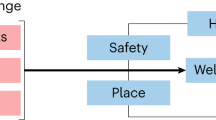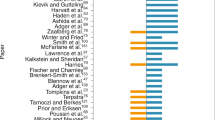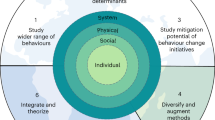Abstract
Human behaviour is integral not only to causing global climate change but also to responding and adapting to it. Here, we argue that psychological research should inform efforts to address climate change, to avoid misunderstandings about human behaviour and motivations that can lead to ineffective or misguided policies. We review three key research areas: describing human perceptions of climate change; understanding and changing individual and household behaviour that drives climate change; and examining the human impacts of climate change and adaptation responses. Although much has been learned in these areas, we suggest important directions for further research.
This is a preview of subscription content, access via your institution
Access options
Subscribe to this journal
Receive 12 print issues and online access
$209.00 per year
only $17.42 per issue
Buy this article
- Purchase on Springer Link
- Instant access to full article PDF
Prices may be subject to local taxes which are calculated during checkout




Similar content being viewed by others
References
National Research Council Global Environmental Change: Understanding the Human Dimensions (eds Stern, P. C., Young O. R. & Druckman, D.) (National Academies, 1992).
National Research Council America's Climate Choices (National Academies, 2011).
Dietz, T., Gardner, G., Gilligan, J. M., Stern, P. & Vandenbergh, M. Household actions can provide a behavioural wedge to rapidly reduce US carbon emissions. Proc. Natl Acad. Sci. USA 106, 18452–18456 (2009).
Bolderdijk, J. W. & Steg, L. in Handbook of Research on Sustainable Consumption (eds Thogersen, J. & Reisch, L.) 328–342 (Edward Elgar, 2015).
Gardner, G. T. & Stern, P. C. Environmental Problems and Human Behaviour (Allyn & Bacon, 1996).
Swim, J. K., Geiger, A. N. & Zawadzki, S. J. Psychology and energy-use reduction policies. Policy Insights Behav. Brain Sci. 1, 180–188 (2014).
Hackmann, H., Moser, S. C. & St. Clair, A. L. The social heart of global environmental change. Nature Clim. Change 4, 653–655 (2014).
Sovacool, B. K. Energy studies need social science. Nature 511, 529–530 (2014).
Stern, P. C. Psychological dimensions of global environmental change. Annu. Rev. Psychol. 43, 269–302 (1992).
Swim, J. et al. Psychology's contributions to understanding and addressing global climate change. Am. Psychol. 66, 241–250 (2011).
Clayton, S. & Myers, G. Conservation Psychology: Understanding and Promoting Human Care for Nature (Wiley-Blackwell, 2009).
Capstick, S., Whitmarsh, L., Poortinga, W., Pidgeon, N. & Upham, P. International trends in public perceptions of climate change over the past quarter century. WIREs Clim. Change 6, 35–61 (2015).
Kahan, D. et al. The polarizing impact of science literacy and numeracy on perceived climate change risks. Nature Clim. Change 2, 732–735 (2012).
Gifford, R. The dragons of inaction: Psychological barriers that limit climate change mitigation and adaptation. Am. Psychol. 66, 290–302 (2011).
Weber, E. U. & Stern, P. C. Public understanding of climate change in the United States. Am. Psychol. 66, 315–328 (2011).
Rudman, L. A., McLean, M. C. & Bunzl, M. When truth is personally inconvenient, attitudes change: The impact of extreme weather on implicit support for green politicians and explicit climate-change beliefs. Psychol. Sci. 24, 2290–2296 (2013).
Spence, A., Poortinga, W., Butler, C. & Pidgeon, N. F. Perceptions of climate change and willingness to save energy related to flood experience. Nature Clim. Change 1, 46–49 (2011).
Whitmarsh, L. What's in a name? Commonalities and differences in public understanding of 'climate change' and 'global warming'. Public Underst. Sci. 18, 401–420 (2009).
Howe, P. D. & Leiserowitz, A. R. Who remembers a hot summer or a cold winter? The asymmetric effect of beliefs about global warming on perceptions of local seasonal climate conditions in the U. S. Glob. Environ. Change 23, 1488–1500 (2013).
Petty, R. E. & Cacioppo, J. T. The Elaboration Likelihood Model of Persuasion (Academic, 1986).
Fielding, K. S., Hornsey, M. J. & Swim, J. K. Developing a social psychology of climate change. Eur. J. Soc. Psychol. 44, 413–420 (2014).
Guber, D. L. A cooling climate for change? Party polarization and the politics of global warming. Am. Behav. Sci. 57, 93–115 (2013).
Poortinga, W., Spence, A., Whitmarsh, L., Capstick, S. & Pidgeon, N. Uncertain climate: An investigation into public skepticism about anthropogenic climate change. Glob. Environ. Change 21, 1015–1024 (2011).
Costa, D. L. & Kahn, M. E. Do liberal home owners consume less energy? A test of the voluntary restraint hypothesis. Econ. Lett. 119, 210–212 (2013).
Kahan, D. M., Jenkins-Smith, H. & Braman, D. Cultural cognition of scientific consensus. J. Risk Res. 14, 147–174 (2010).
McCright, A., Xiao, C. & Dunlap, R. Political polarization on support for government spending on environmental protection in the USA, 1974–2012. Soc. Sci. Res. 48, 251–260 (2013).
Painter, J. & Ashe, T. Cross-national comparison of the presence of climate scepticism in the print media in six countries, 2007–10. Environ. Res. Lett. 7, 044005 (2012).
Stern, P. C. & Raimi, K. T. Simple mental models for informing climate choices. Soc. Res. (in the press).
Bolderdijk, J. W., Gorsira, M., Keizer, K. & Steg, L. Values determine the (in)effectiveness of informational interventions in promoting pro-environmental behaviour. PLoS ONE 8, e83911 (2013).
Jang, S. M. Framing responsibility in climate change discourse: Ethnocentric attribution bias, perceived casus, and policy attitudes. J. Environ. Psychol. 36, 27–36 (2013).
Kahneman, D. & Tversky, A. Judgment under uncertainty: Heuristics and biases. Science 185, 1124–1131 (1974).
Brulle, R. J., Carmichael, J. & Jenkins, J. C. Shifting public opinion on climate change: An empirical assessment of factors influencing concern over climate change in the U.S., 2002–2010. Clim. Change 114, 169–188 (2012).
Deryugina, T. How do people update? The effects of local weather fluctuations on beliefs about global warming. Clim. Change 118, 397–416 (2013).
Slovic, P., Finucane, M. L., Peters, E. & MacGregor, D. G. Risk as analysis and risk as feelings: Some thoughts about affect, reason, risk, and rationality. Risk Anal. 24, 311–322 (2004).
Lord, C. G., Ross, L. & Lepper, M. R. Biased assimilation and attitude polarization: The effects of prior theories on subsequently considered evidence. J. Pers. Soc. Psychol. 37, 2098–2109 (1979).
Corner, A. Whitmarsh, L. & Xenias, D. Uncertainty, skepticism and attitudes towards climate change: Biased assimilation and attitude polarisation. Clim. Change 114, 463–478 (2012).
Kempton, W. How the public views climate change. Environment 39, 12–21 (1997).
Bostrom, A., Böhm, G. & O'Connor, R. E. Tailoring climate change communication to audiences. WIREs Clim. Change 4, 447–455 (2013).
Böhm, G. & Pfister, H-R. Consequences, morality, and time in environmental risk evaluation. J. Risk Res. 8, 461–479 (2005).
Gattig, A. & Hendrickx, L. Judgmental discounting and environmental risk perception. J. Soc. Issues 63, 21–39 (2007).
Abrahamse, W. & Steg, L. How do socio-demographic and psychological factors relate to households' direct and indirect energy use and savings? J. Econ. Psychol. 30, 711–720 (2009).
Gatersleben, B., Steg, L. & Vlek, C. Measurement and determinants of environmentally significant consumer behaviour. Environ. Behav. 34, 335–362 (2002).
Stern, P. C., Dietz, T., Abel, T., Guagnano, G. A. & Kalof, L. A value-belief-norm theory of support for social movements: The case of environmentalism. Hum. Ecol. Rev. 6, 81–97 (1999).
Abrahamse, W. & Steg, L. Social influence approaches to encourage resource conservation: A meta-analysis. Glob. Environ. Change 23, 1773–1785 (2013).
Van der Werff, E., Steg, L. & Keizer, K. The value of environmental self-identity: The relationship between biospheric values, environmental self-identity and environmental preferences, intentions and behaviour. J. Environ. Psychol. 34, 55–63 (2013).
Kahneman, D. Thinking Fast and Slow (Farrer, Straus & Giroux, 2013).
Abrahamse, W., Steg, L., Vlek, C. & Rothengatter, T. A review of intervention studies aimed at household energy conservation. J. Environ. Psychol. 25, 273–291 (2005).
Fischer, C. Feedback on household electricity consumption: A tool for saving energy? Energ. Efficien. 1, 79–104 (2008).
Nolan, J. M., Schultz, P. W., Cialdini, R. B., Goldstein, N. J. & Griskevicius, V. Normative social influence is underdetected. Pers. Soc. Psychol. B. 34, 913–923 (2008).
Cohen, M. A. & Vandenbergh, M. P. The potential role of carbon labeling in a green economy. Energ. Econ. 34, S53–S63 (2012).
Shewmake, S., Cohen, M. A., Stern, P. C. & Vandenbergh, M. P. in Handbook of Research on Sustainable Consumption (eds Reisch, L. & Thøgerson J.) 285–299 (Edward Elgar, 2015).
Bolderdijk, J. W., Steg, L., Geller, E. S., Lehman, P. K. & Postmes, T. Comparing the effectiveness of monetary versus moral motives in environmental campaigning. Nature Clim. Change 3, 413–416 (2013).
Hirst, E. & Brown, M. Closing the efficiency gap: Barriers to the efficient use of energy. Resour. Conserv. Recy. 3, 267–281 (1990).
Mind the Gap: Quantifying Principal-Agent Problems in Energy Efficiency (International Energy Agency, 2007); http://www.iea.org/publications/freepublications/publication/mind_the_gap.pdf.
Stern, P. C. Blind spots in policy analysis: What economics doesn't say about energy use. J. Policy Anal. Manag. 5, 200–227 (1986).
Stern, P. C., Gardner, G. T., Vandenbergh, M. P., Dietz, T. & Gilligan, J. Design principles for carbon emissions reduction programs. Environ. Sci. Technol. 44, 4847–4848 (2010).
Vandenbergh, M. P., Stern, P. C., Gardner, G. T., Dietz, T. & Gilligan, J. Implementing the behavioural wedge. Environ. Forum 28, 54–63 (2011).
Carrico, A. & Riemer, M. Motivating energy conservation in the workplace: An evaluation of the use of group-level feedback and peer education. J. Environ. Psychol. 31, 1–13 (2011).
Evans, L. et al. Self-interest and pro-environmental behaviour. Nature Clim. Change 3, 122–125 (2013).
Noppers, E., Keizer, K., Bolderdijk, J. W. & Steg, L. The adoption of sustainable innovations: Driven by symbolic and environmental motives. Glob. Environ. Change 25, 52–62 (2014).
Devine-Wright, P., Wrapson, W., Henshaw, V. & Guy, S. Low carbon heating and older adults: Comfort, cosiness and glow. Build. Res. Inf. 42, 288–299 (2014).
Dogan, E., Bolderdijk, J. W. & Steg, L. Making small numbers count: Environmental and financial feedback in promoting eco-driving behaviours. J. Consum. Policy 37, 413–422 (2014).
Devine-Wright, P. Rethinking NIMBYism: The role of place attachment and place identity in explaining place protective action. J. Community Appl. Soc. 19, 426–441 (2009).
Perlaviciute, G. & Steg, L. Contextual and psychological factors shaping evaluations and acceptability of energy alternatives: Integrated review and research agenda. Renew. Sust. Energ. Rev. 35, 361–381 (2014).
Korpela, K. in The Oxford Handbook of Environmental and Conservation Psychology (ed Clayton, S.) 148–163 (Oxford Univ. Press, 2012).
Devine-Wright, P. & Howes, Y. Disruption to place attachment and the protection of restorative environments: A wind energy case study. J. Environ. Psychol. 30, 271–280 (2010).
Devine-Wright, P. Explaining 'NIMBY' objections to a power line: The role of personal, place attachment and project-related factors. Environ. Behav. 45, 761–781 (2013).
Steg, L., Dreijerink, L. & Abrahamse, W. Why are energy policies acceptable and effective? Environ. Behav. 38, 92–111 (2006).
Eriksson, L., Garvill, J. & Nordlund, A. Acceptability of travel demand management measures: The importance of problem awareness, personal norm, freedom, and fairness. J. Environ. Psychol. 26, 15–26 (2006).
Schuitema, G., Steg, L. & Rothengatter, J. A. Relationship between the acceptability, personal outcome expectations and the expected effects of transport pricing policies. J. Environ. Psychol. 30, 587–593 (2010).
Dreyer, S. & Walker, I. Acceptance and support of the Australian carbon policy. Soc. Justice Res. 26, 323–362 (2013).
Schuitema, G., Steg, L. & Van Kruining, M. When are transport policies fair and acceptable? The role of six fairness principles. Soc. Justice Res. 24, 66–84 (2011).
Doherty, T. & Clayton, S. The psychological impacts of global climate change. Am. Psychol. 66, 265–276 (2011).
Weissbecker, I. (ed) Climate Change and Human Well-Being: Global Challenges and Opportunities (Springer, 2011).
IPCC Climate Change 2013: The Physical Science Basis (eds Stocker, T. et al.) (Cambridge Univ. Press, 2013).
National Research Council Climate and Social Stress: Implications for Security Analysis (eds Steinbruner, J. D., Stern, P. C. & Husbands, J. L.) (National Academies, 2013).
Galea, S., Nandi, A. & Vlahov, D. The epidemiology of post-traumatic stress disorder after disasters. Epidemiol. Rev. 27, 78–91 (2005).
Norris, F. H. et al. 60,000 disaster victims speak: Part I. An empirical review of the empirical literature, 1981–2001. Psychiatry 65, 207–239 (2002).
Agnew, R. Dire forecast: A theoretical model of the impact of climate change on crime. Theor. Criminol. 16, 21–42 (2012).
Hsiang, S., Burke, M. & Miguel, E. Quantifying the influence of climate on human conflict. Science 341, 1235367 (2013).
Warner, K. Global environmental change and migration: Governance challenges. Glob. Environ. Change 20, 402–413 (2010).
Speller, G., Lyons, E. & Twigger-Ross, C. A community in transition: The relationship between spatial change and identity. Soc. Psychol. Rev. 4, 39–58 (2002).
Agyeman, J., Devine-Wright, P. & Prange, J. 'Close to the edge, down by the river?' Joining up managed retreat and place attachment in a climate changed world. Environ. Plann. A 41, 509–513 (2009).
Grothmann, T. & Patt, A. Adaptive capacity and human cognition: The process of individual adaptation to climate change. Glob. Environ. Change 15, 199–213 (2005).
Bockarjova, M. & Steg, L. Can Protection Motivation Theory predict pro-environmental behaviour? Explaining the adoption of electric vehicles in the Netherlands. Glob. Environ. Change 28, 276–288 (2014).
Esham, M. & Garforth, C. Agricultural adaptation to climate change: Insights from a farming community in Sri Lanka. Mitig. Adapt. Strat. Glob. Change 18, 535–549 (2012).
Ostrom, E. A general framework for analyzing sustainability of social-ecological systems. Science 325, 419–22 (2009).
Van Vugt, M. Averting the tragedy of the commons: Using social psychological science to protect the environment. Curr. Dir. Psychol. Sci. 18, 169–173 (2009).
Penner, L. A., Dovidio, J. F., Piliavin, J. A. & Schroeder, D. A. Prosocial behaviour: Multilevel perspectives. Annu. Rev. Psychol. 56, 365–392 (2005).
Dash, N. & Gladwin, H. Evacuation decision making and behavioural responses: Individual and household. Natural Hazards Rev. 8, 69–77 (2007).
Kunreuther, H. Mitigating disaster losses through insurance. J. Risk Uncertainty 12, 171–187 (1996).
De Dominicis, S. et al. Vested interest and environmental risk communication: Improving willingness to cope with impending disasters. J. Appl. Soc. Psychol. 44, 364–374 (2014).
Rogers, M., Curtis, A. & Mazur, N. The influence of cognitive processes on rural landholder responses to climate change. J. Environ. Manage. 111, 258–266 (2012).
Marshall, N. A., Park, S. E., Adger, N. E., Brown, K. & Howden, S. M. Transformational capacity and the influence of place and identity. Environ. Res. Lett. 7, 034032 (2012).
De Young, R. Some behavioural aspects of energy descent: How a biophysical psychology might help people transition through the lean times ahead. Front. Psychol. 5, 1255 (2014).
Schoot Uiterkamp, A. & Vlek, C. Practice and outcomes of multidisciplinary research for environmental sustainability. J. Soc. Issues 63, 175–197 (2007).
Weaver, C. P. et al. From global change science to action with social sciences. Nature Clim. Change 4, 656–659 (2014).
Clayton, S., Manning, C. M. & Hodge, C. Beyond Storms & Droughts: The Psychological Impacts of Climate Change (American Psychological Association and ecoAmerica, 2014); http://ecoamerica.org/research/#PsychImpacts.
Acknowledgements
The authors thank J. Taylor of the Wildlife and Environment Society of South Africa and C. Werner of the University of Utah for their contributions to the workshop from which this paper developed. We also acknowledge the support of the National Socio-Environmental Synthesis Center (NSF award DBI-1052875).
Author information
Authors and Affiliations
Contributions
All authors contributed to the writing of this paper.
Corresponding author
Ethics declarations
Competing interests
The authors declare no competing financial interests.
Rights and permissions
About this article
Cite this article
Clayton, S., Devine-Wright, P., Stern, P. et al. Psychological research and global climate change. Nature Clim Change 5, 640–646 (2015). https://doi.org/10.1038/nclimate2622
Received:
Accepted:
Published:
Issue Date:
DOI: https://doi.org/10.1038/nclimate2622
This article is cited by
-
Place-based reflexivity for just energy social science
Nature Energy (2024)
-
Perception of health risks in contexts of extreme climate change in semiarid Northeastern Brazil: an analysis of the role of socioeconomic variables
Journal of Ethnobiology and Ethnomedicine (2023)
-
The key determinants of individual greenhouse gas emissions in Germany are mostly domain-specific
Communications Earth & Environment (2023)
-
Climate change beliefs and their correlates in Latin America
Nature Communications (2023)
-
Increasing intention to reduce fossil fuel use: a protection motivation theory-based experimental study
Climatic Change (2023)



